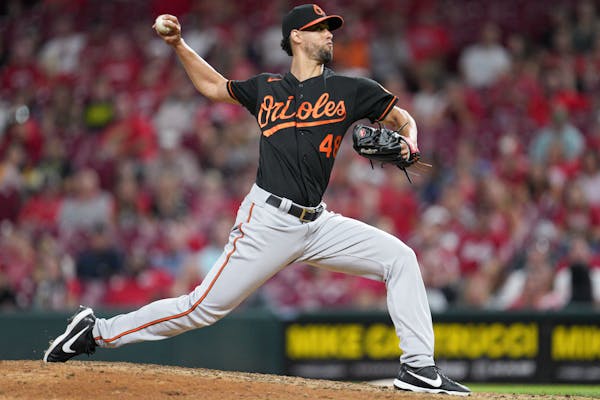 See
more of the story
See
more of the story
The 2019 Twins won 101 games, set an MLB record for home runs with 307 and generally thrilled fans from April through September.
But the defining legacy of that team might be a combination of bad luck and bad timing: Those 101 wins were only third-best in the AL, and the playoff format that year meant their reward for that remarkable season was being the road team against the 103-win Yankees in a best-of-five ALDS.
The Twins compounded that bad draw by playing three of their worst games of the season, getting swept in three games by a combined score of 23-7.
Those losses pushed their postseason losing streak to 16, and two more losses in 2020 extended the most inglorious of records: no team in any major professional North American sports league has ever lost more playoff games in a row.
The Twins didn't have to worry about that in 2021 as they drifted backward into a 73-89 record. This year seemed like it might be more of the same, but a strong early burst and a weak AL Central put Minnesota in first place heading into Tuesday's trade deadline.
These Twins, at 54-49, are far from great. But the Yankees (70-35) and Astros (67-38) are the AL's only great teams. In a playoff series against one of those teams, the Twins would likely get squished, meaning a World Series title is extremely unlikely this year.
But as Chip Scoggins and I talked about on Wednesday's Daily Delivery podcast — during which we spent a lot of time breaking down the Twins' significant trade deadline upgrades — there should be room to define a season as successful even if it doesn't result in the raising of a championship banner.
That might be an unpopular sentiment with the modern fan's "championship or bust" thinking, but it's also pragmatic.
You can be realistic about your ceiling without sinking to your floor, which pretty well describes the scope of the three deals Derek Falvey and Thad Levine executed on Tuesday. They didn't get the best of the best, but they did acquire an All-Star reliever (Jorge Lopez), another useful bullpen arm (Michael Fulmer) and a rotation-bolstering starter (Tyler Mahle).
They did so while Cleveland and Chicago sat and watched, doing virtually nothing.
If you're inclined to say "big deal. Even if they manage to win this weak division, they are still going to get clobbered in the playoffs," then let's consider how 2022 sets up to be the potential antidote to 2019's combination of bad timing and bad luck.
The new playoff format this season: Six teams make it in each league. The top two division winners in each league get a bye. Then the other division winner hosts all three games of a best-of-3 against the lowest wild card seed, while the same is true in the 4-5 series between the top two wild cards.
So the 2022 Twins could win the AL Central with, say, 87 wins and get to host a series as the No. 3 seed against the No. 6 seed — a team like the Rays or Mariners. I'd give the Twins a real shot to win that series — and a better than real shot to at least break that ugly playoff losing streak.
Falvey and Levine clearly saw value in that, even if they would probably concede under the influence of truth serum that advancing further through the gauntlet of the Astros and Yankees is far-fetched at best.
If their challenge going into the deadline was finding a sweet spot that involved doing enough to compete while not decimating the farm system, they pretty well succeeded. Even if the pitching mess that led to those deadline moves was largely one of their own making, trying to fix it is certainly preferable to pretending the problem isn't real.
All you can hope for is a chance to win. The Twins have had far better teams than this one, but they won't always have this opportunity.





